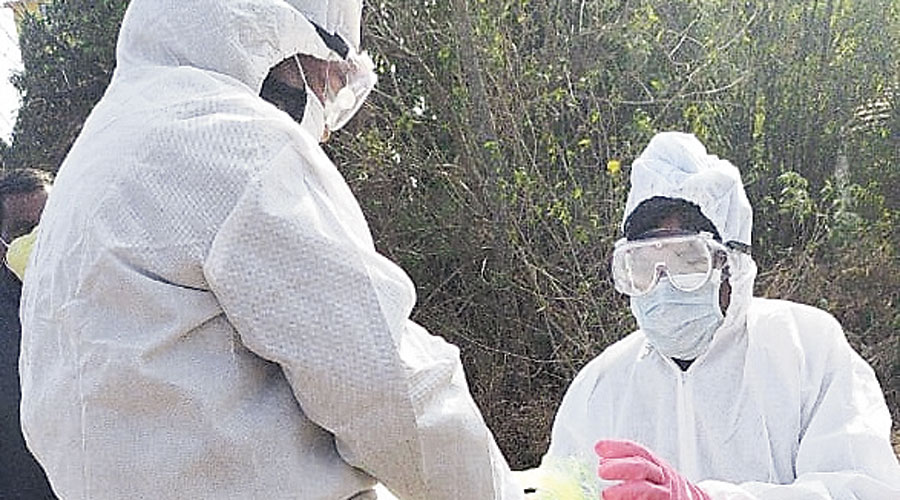The health department has instructed poultry farm workers and others who handle birds and animals to wear protective gowns, gloves and goggles to protect themselves from the avian influenza (HSN1) virus.
There have been reports of outbreak of the disease in some states but so far the virus has not been detected in Bengal or the adjoining states - Jharkhand, Bihar and Odisha.
The Union health ministry has said the disease is zoonotic, which means it can spread between animals and people, but infection in humans has not yet been reported in India.
Experts have said the virus doesn't spread from cooked or boiled poultry products.
The health ministry has also advised states to tackle rumors that may influence poultry product consumers.
In a two-page advisory to the chief medical health officer of the Calcutta Municipal Corporation and his counterparts in 23 districts of Bengal, the deputy director of health services (public health) has said those working in poultry farms and handling animals and birds should wear gowns, gloves, goggles and shoes.
At the end of the day's work, the protective gear should be discarded or sanitised. No one should eat or smoke while working in poultry farms or handling animals and birds.
“The idea is to spread awareness, stop rumors and prepare our officials to tackle a situation,” said an official at Swasthya Bhavan, the health department headquarters. “The municipal health officer of the Calcutta Municipal Corporation has been requested to step up surveillance in all 144 wards. The deputy CMOHs have been instructed to circulate the guideline among community-level workers, including health assistants and Asha workers.”
Monday’s advisory refers to the recent death of migratory and other birds in Himachal Pradesh and an order issued by the Union ministry of environment, forest and climate change to states and Union Territories to take “steps for containing the spread of the disease”.
Bengal is the third meat producing state in India after Uttar Pradesh and Andhra Pradesh. Bengal produces around 2.5 crore kg of chicken every week and consumes around 2 crore kg. The rest is exported to neighbouring states.
Around 5 lakh farmers are directly involved in the poultry business and another 10 lakh are involved indirectly, according to officials of the West Bengal Poultry Federation.
“There have been no reports of bird flu in Bengal or its adjoining states as of now. So don’t get alarmed,” said Madan Mohan Maity, the general secretary of the federation.
“We urge people to eat more chicken and eggs because that is the cheapest way to build protein.”
The advisory spells out that avian bird flu doesn't spread from cooked food and asks officials to keep all those who have been exposed to dead or sick birds under surveillance and provide them antiviral medicines for 10 days.
“We have been asked to get in touch with public health officials and their counterparts in the animal resources development (ARD) department immediately if there are reports of unusual symptoms or death of common birds, wild birds and those in poultries," said an official of Birbhum district, which had witnessed over 61,000 poultry deaths during the last outbreak of bird flu in India in 2008.
The advisory also instructs health officials to find ways to minimise bird-human interface and use masks, goggles and gloves while handling sick and dead birds. Officials in the district have been asked to keep adequate stock of masks, personal protective equipment, swab sticks and antiviral medicines as a preventive measure.
Health workers have been instructed to spread awareness among farmers so they remain alert to certain symptoms among birds such as vigorous shaking and drooping heads.











